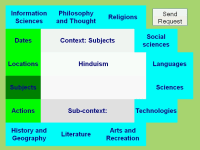It is estimated that nearly 2 billion people are using the Internet. Recent studies have shown that news and information are just as important to many of these users as entertainment or shopping.
Search engines are the only workable way to find information on the internet when the user doesn't already know what URL(s) to use. But the standard search engine interface consists of a single line for entry of key words, and commonly returns thousands of suggested links. For serious researchers, students, workers and citizens trying to become better-informed, this search paradigm wastes time. They need a way to narrow down their searches quickly without learning how to use logical operators, special characters, etc.
This suggests the need for a website – and an organization – dedicated to assisting serious researchers to find what they are looking for faster and more effectively. The proposed site would use an enhanced input page that would help users narrow down what they were looking for using lists of contexts and keywords that the user could just click on.
Based on the user's entry, the site would construct a recommended query and send it to the search engine. The user would then receive a list of suggested links, just as if the search engine's own home page had been used. But if the user desires, the site can also look for similar entries from other users. The site allows users to rate the effectiveness of the queries it creates, accumulating a database of those that are most effective. So it can also provide the user with a list of already-tested queries which can be saved for future use and also rated by this user. This results in an ever-expanding database of most-used and most-effective queries.
The vision includes an educational purpose. The site would maintain a large collection of workable logical systems for storing, organizing and retrieving data (such as those used by libraries) and make these systems available to users. This would help users to see how the data they are interested in can be related to the whole “universe of knowledge.”
The organization envisioned to run this project would need to be politically independent and not for profit. In addition to a core of technical experts, it would employ many others to work at home testing queries and adding to the database.
Search engines are successful because they operate automatically and generate revenue for advertisers. Citizens, students and researchers usually can't afford to pay anything more than their monthly connection fee for the right to use the internet. But more and more, they depend on it to learn and to stay informed. They need a people-centric organization and website dedicated to serving their needs for quality information.
Illustrations:
1. Overall system design.
2. Simple entry with one keyword and context, displaying the top ten categories of the Dewey Decimal System.
3. Second keyword and sub-context added to first entry.
Like this entry?
-
About the Entrant
- Name:Larry Cox
- Type of entry:individual
- Software used for this entry:Crimson Editor and Irfan View
- Patent status:none








